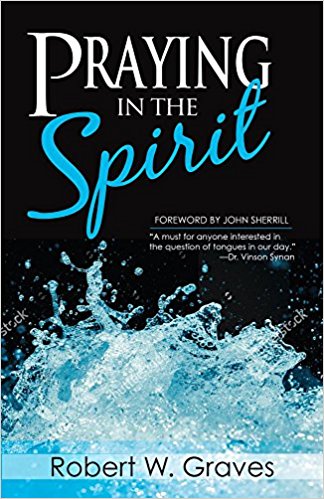Robert Graves: Praying in the Spirit, 2nd edition
 Robert W. Graves, Praying in the Spirit (Tulsa, OK, Empowered Life, 2017), 280 pages, ISBN 9781680310870.
Robert W. Graves, Praying in the Spirit (Tulsa, OK, Empowered Life, 2017), 280 pages, ISBN 9781680310870.
Praying in the Spirit was first released in 1987. Now, thirty years later, it has been re-released in an updated and expanded edition. Robert Graves is eminently qualified to write about this subject because of his longstanding connections to the Pentecostal Movement. He is a member of the Society of Pentecostal Studies, has taught at an Assemblies of God College, and is the co-founder and President of the Foundation for Pentecostal Scholarship.
The book consists of a forward, preface, introduction, ten chapters, afterword, and four appendixes. As you read through this volume you will see that it contains some history, theology, practical instruction, and apologetics for the biblical practice of speaking in tongues. The historical element can be seen in the first chapter in which the author refers to a number of people from outside of the Pentecostal Movement who have spoken in tongues. The individuals mentioned were largely part of what is commonly called the Charismatic Movement; they came from both the mainline Protestant churches and the Roman Catholic Church. Some of the people mentioned include: Dennis Bennett, Terry Fullam, Michael Harper, Larry Christianson, Cardinal Suenens, and Kevin and Dorthy Ranaghan. Some of the theological content of the book can be seen in chapters given to a consideration of what some non-Charismatics are now saying about speaking in tongues (Chapter 2), a description of the effects of praying in the Spirit (chapter 3), and a description of the nature of the prayer language (chapter 5). Practical instruction is particularly evident in chapter 8, “How the Prayer Language Comes,” where Graves offers instruction, encouragement, and counsel about how one may enter into the biblical experience of speaking in tongues. The apologetic for the contemporary practice of speaking in tongues can be found in the appendixes. These appendixes make up almost half of the book and are much more academic in content than the chapters of the book. The appendixes are: “Foreign vs. Unknown Languages,” “When Will Tongues Cease?,” “The Acts-As-History Argument Against the Lukan Theme of Spirit-Baptism,” and “The Day Tongues Left the Leaders Speechless.” In the appendixes the reader will learn some of the ways that cessationists attempt to invalidate the present day practice of speaking in tongues. However, each of the arguments set forth by cessationists are soundly answered. Continuationists will surely find this section of the book very affirming. I have read much over the years about the Baptism in the Holy Spirit and speaking in tongues but I learned some new things in this section of the book.

Author Robert W. Graves
This book has many commendable qualities. I enjoyed one statement made in the Introduction of the book. On page 1 it says “Someone has pointed out that the majority of the New Testament, if not all of it, was written by men who spoke in tongues.” This is a good point to keep in mind when considering this subject. Early Christian leaders spoke in tongues. The fact that this book is a re-release contributes to its value; it contains input from both older and more recent scholarship. One example of newer scholarship that is reflected in this volume is the inclusion of references to the works of New Testament scholar, Dr. Craig Keener. I was pleased to see that Graves devoted a chapter to the topic of singing in the Spirit. Continuationists, both Pentecostals and Charismatics, will for the most part enjoy this book. However, the author does set forth a scriptural truth that will challenge the practice in many Pentecostal and Charismatic gatherings. In many Spirit-filled gatherings when a person exercises the spiritual gift of speaking in tongues that requires interpretation (see 1 Cor. 12 and 14) the interpretation that comes forth is quite frequently a message from God. That is, God speaks to His people, encouraging or directing them. But Graves points out that Scripture does not teach that tongues and interpretation result in a message from God. The author calls the reader’s attention to the fact that the various words connected with speaking in tongues in 1 Corinthians 14, words like praise, and thanksgiving indicate that what is spoken is addressed to God not to men (pages109-110). Tongues and the interpretation of tongues taken together are not the same as the gift of prophecy, which is a word from God to His people 1 Cor. 14:3).
Category: Spirit, Spring 2017


